We occasionally link to goods offered by vendors to help the reader find relevant products. Some of these may be affiliate based, meaning we earn small commissions (at no additional cost to you) if items are purchased. Here is more about what we do.
“If you can read a recipe, you can cook.”
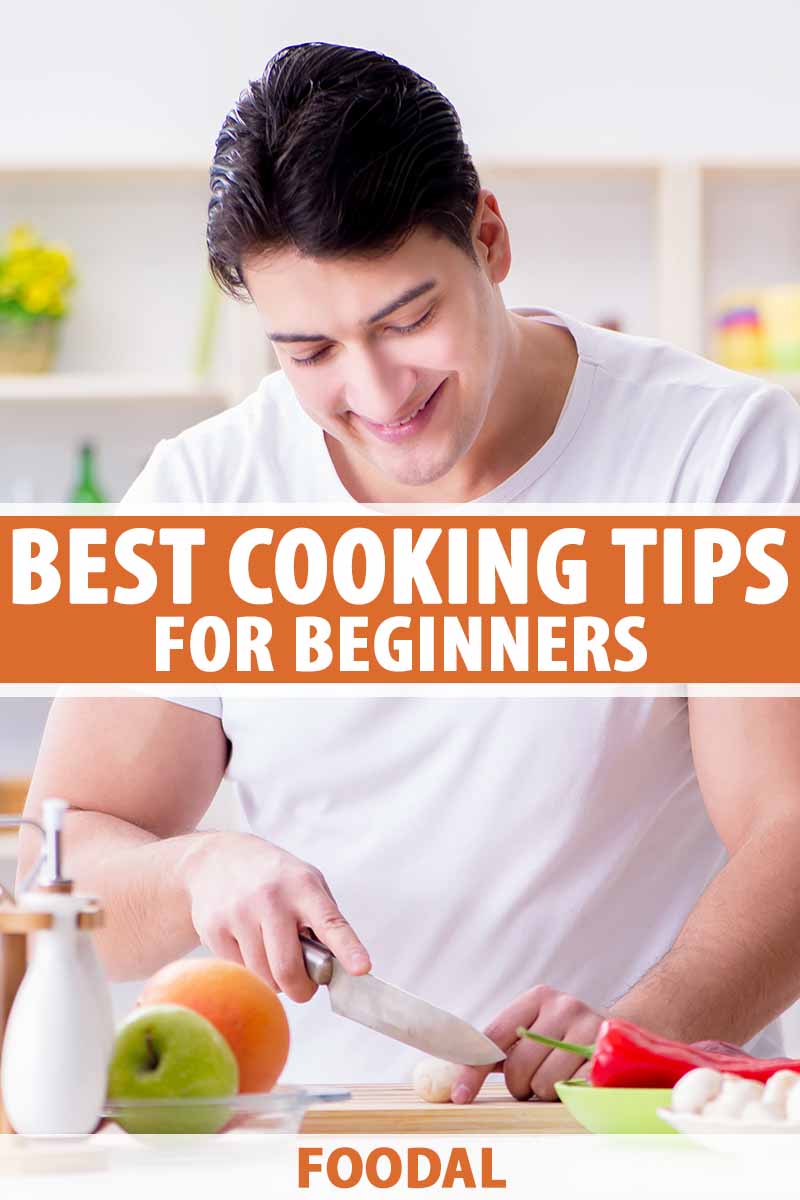
Have you been told this countless times as a beginner home cook? And do you absolutely hate that phrase?
For someone who is just starting out in the kitchen, the anxiety about cooking does not immediately vanish as soon as you read an ingredient list and step-by-step instructions.
So much more is involved!
When you’re learning to cook, there is significant work to do throughout the entire process, from equipping your kitchen to cleaning up after the final bite.
Once you understand the basics and build a strong foundation complete with thorough preparation, realistic goals, and consistent organization, that’s when you can start to slowly unleash your culinary imagination.
With experience gained over time paired with a hunger for learning new recipes, you’ll be pleasantly surprised with what you can create!
But to get to that point, we need to start at the very beginning. Follow these tips and suggestions to learn how to cook with confidence!
Cooking Tips for Beginners
Carefully Read the Recipe
Approaching a completely new recipe can be overwhelming, and it may be scary for a cook with little experience.
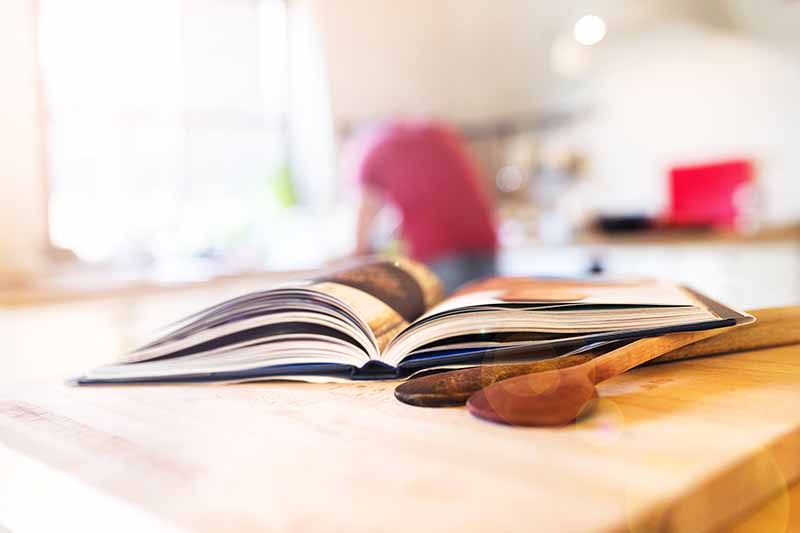
The best advice I can give is to avoid rushing this process. Slowly and thoroughly read through the recipe you want to make.
A technique I have for working with new recipes is to read the entire recipe once all the way through, then write it out or read it aloud a second time.
Each segment of a recipe provides essential information that you will need to understand. And sometimes an important step can be missed if you only skim through a recipe once!
Starting with the ingredient list, make sure you fully comprehend every measurement and ingredient you will need. If you’re confused about a type of measurement or don’t know what ingredient is required, take a pause to look up this information.
Now, this is not to say that you need to hang on every single word as gospel. As you are reading a recipe, keep in mind that prep, passive, cooking, and total times are estimates when these are provided.
Preparing a recipe also involves a lot of common sense.
Let’s consider a popular cooking scenario – making a weeknight chicken dinner!
If your recipe suggests that you roast your chicken for 45 minutes, but you take it out and it’s still clucking – er, raw and cold! – you’ll need to continue cooking it and keep an eye on it until it reaches the intended temperature.
The best way to know if what you are preparing is actually done is to be mindful of the estimated times provided, but to also take the reins and make your own sensible judgements along the way, relying on your senses and your knowledge of food.
Also keep in mind that just because your chicken wasn’t done at the 45-minute mark, it’s not necessarily your fault, and it might not be the recipe’s fault either.
Don’t overreact and deem this a cooking mistake or failure. Making adjustments is common and necessary when preparing food at home. Your cut of meat may be bigger and thicker, and your oven might behave differently.
Just read the recipe, follow directions, be safe, and use some common sense to adapt to small and unexpected scenarios.
Another reason why reading and reviewing your recipe before anything else is important is so that you can take inventory and be sure you have everything that you need.
When you are reading through a recipe, take five quick minutes to check your fridge and cabinets for all of the ingredients. You’ll also want to review whether you have all the required equipment and tools.
If you don’t have a stand mixer, hand mixer, or whisk, you’re going to have a hard time making a meringue.
At the same time, if you don’t have eggs, or a can of chickpeas, then you’re definitely not making a meringue!
I can only imagine how irritated I’d be to get the pie shell and lemon filling ready for the meringue on top, only to find I don’t have one of the main ingredients or tools on hand!
Equip Your Kitchen
Speaking of kitchen equipment…
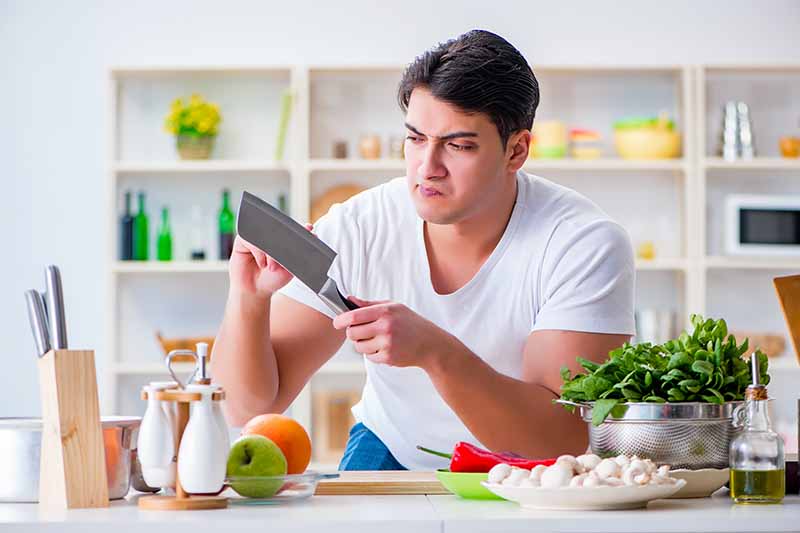
Having the proper equipment in your kitchen will save you from many instances of unpreparedness, failure, disappointment, and frustration.
Starting out, you don’t need a lot – just a few foundational basics that will be your best buds as you cook and bake.
Think of the items you purchase as an investment – if you purchase quality tools now, your cooking experience will be positive and you won’t have to repurchase the same equipment again any time soon.
Here is a quick list of the most essential pieces:
- Baking sheets
- Colanders and strainers
- Cutting boards
- Casserole dishes
- Dry and liquid measuring cups
- Kitchen scale
- Kitchen shears
- Kitchen towels
- Knives
- Measuring spoons
- Meat thermometer
- Metal mixing bowls
- Pots and pans
- Skillets
- Tongs
- Whisks
Let’s discuss the items on this list in more detail.
Overall, you will want to own multiples of certain pieces of kitchen equipment. Your kitchen flow and efficiency will benefit greatly when you have multiple kitchen towels, tongs, spoons, whisks, spatulas, cutting boards, mixing bowls, and pots and pans in different sizes.
For example, if you use your one and only towel to clean up a mess, what will you do when you make yet another mess a minute later? And you don’t want to be stuck in a perpetual cycle of cleaning the same spatula over and over and over again for a single recipe!
Having numerous cutting boards will help you more easily designate one for raw meat, one for fruit/vegetable prep, and another for ready-to-eat items.
I would also recommend that a beginner chef purchase a cookware and bakeware set, rather than buying individual pieces – all of the essentials will be included in a single purchase.
Sets are carefully curated to meet the various needs of most home cooks, and these can be as simple as a 3-piece set or as abundant as a set with a dozen or more items.
If you are determined to make a variety of recipes, anything from cakes to steaks, you’ll make a smart decision choosing a larger set. However, if you only want to start introducing a few home-cooked meals each month, a smaller set might be all you need in the beginning.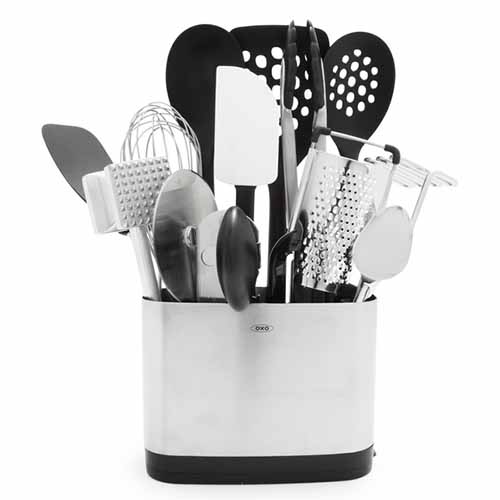
OXO Good Grips 15-Piece Everyday Kitchen Tool Set, available on Sur La Table
Start by purchasing a set of popular kitchen utensils – these will all become your trusty tools as you handle task after task in the kitchen. You’ll confidently wield each tool in the OXO Good Grips 15-Piece Everyday Kitchen Tool Set, available now on Sur La Table. It’s also available directly from OXO.
For your cookware, purchase a set made from a durable material that’s easy to both clean and maintain. Able to withstand years of use with an even distribution of heat, Sur La Table’s Classic 5-Ply Stainless Steel 10-Piece Cookware Set gives you two sizes of saucepans, two sizes of skillets, a saute pan, a casserole dish, and lids for each item.
Sur La Table Classic 5-Ply Stainless Steel 10-Piece Cookware Set, available on Sur La Table
The same goes for your bakeware! Buy a set that will give you the most versatility for multiple baking and cooking tasks. This Sur La Table 7-Piece Signature Bakeware Set has versatile basics you’ll often use.
And when you’re ready to make more financially serious investments, consider reading our reviews of different pieces of kitchen equipment such as food processors, slow cookers, and stand mixers, all of which will immensely assist you with prep and cooking.
Kitchen equipment should be selected based on your own personalized prep style.
For example, if you think you’ll be baking just as often as you’ll be cooking, and you want versatile equipment that can help you with all kinds of prep, a stand mixer that can be used with multiple attachments will be an indispensable purchase.
Get the Feel of It
“Practice makes perfect” is a saying that I’m sure many of us heard from our elementary school music teachers as we fumbled through our first attempts at playing instruments…

But this is a highly accurate saying when it’s applied to learning in the kitchen as well! So take the cliché to heart and start cooking – a lot.
The more time you spend in the kitchen, and the more recipes you make from scratch, the more you will continue to hone and develop your skills – and add your personalized touches.
I always like to make a recipe as closely to how it was originally written as possible the very first time.
After eating the dish, I then take a brief moment to analyze what I liked or didn’t like, and then I make it again in the near future with any tweaks that I think will help to improve it.
You can also choose to adjust as you go, once you’re able to confidently replicate your personal taste preferences through the changes you make in the kitchen.
For instance, if you’re making salsa and the recipe you’re using calls for only one jalapeno, but you and any present company love spicy food, you can self-assuredly leave the seeds and membrane in the jalapeno, or even add two jalapenos instead!
Adding and subtracting ingredients to suit your taste is a skill that you will develop as you get a better feel for the process.
However, I do not recommend playing with your ingredients when it comes to baking, which is more exact and reliant on specific measurements to ensure certain chemical reactions and results.
It’s best to follow instructions and measure ingredients precisely as they are for your recipes that rely on baking techniques, such as cakes, cookies, brownies, muffins, and pastries.
Continued practice will also help you learn how to expertly handle various tools, utensils, and equipment.
You may make a few messy over-easy eggs with broken yolks at first, but you’ll soon be flipping them perfectly the more you make breakfast in the mornings as you learn just the right quick movements with your skillet.
And your knife skills may be a little shaky in the beginning, but after you repeatedly cut enough ingredients like onions, you’ll be slicing and dicing like a pro!
Start Simple
If you’re petrified of failure, start with easy and user-friendly recipes.

It’s as simple as that. Save the expertly prepared prime rib for a few more months down the road.
The best way to build a sense of confidence is to have recurring successes with simple recipes. So what if you’re not cooking circles around Emeril your first time in the kitchen?
Something as simple and easy as a tasty meatloaf and a good side of mashed potatoes will make you feel more confident in your abilities than a collapsed chocolate souffle or gummy risotto.
Also, don’t make your first foray into the kitchen in order to entertain a large party.
Make food for yourself and a few (very) close friends and family before throwing an elaborate dinner party. You want honest, but kind feedback. If you’re going to throw a dinner party, give the whole meal a trial run for yourself and your significant other before you dive head first into the deep end.
You can also safely take a semi-homemade route, employing the help of a selection of prepared food items to give you a shortcut for more complicated techniques.
Love the idea of a fun family pizza night, but you have no idea how to make the dough? For the first time, go ahead and use a premade, store-bought pizza dough. All you need to worry about are the toppings and cooking procedures!
Once you have successfully hosted your first, second, or third pizza night, you can then spread your culinary wings and make your own pizza dough from scratch.
Stay Clean and Organized
You know those bad kitchen habits you might – but totally, definitely, 100% do – have?

Like haphazardly putting dishes away, or leaving your fridge and freezer a mess for months upon months, or not tracking and rotating your pantry purchases? Not cleaning up after making a meal, not caring for your equipment and tools as you should, or not labeling anything after you open a container or store something?
Look me in the eyes and confess, you abominable sinner.
When you want to become a more serious home chef, you’ll need to get clean and organized. No questions asked.
One of the worst ways to start learning to cook is to blindly start cooking without an organized plan, and doing so in a messy situation.
Before putting on your apron and using all your cool new utensils, check out our collection of cleaning articles – you’ll find everything you need to maintain a clean and well-organized kitchen and avoid a chaotic, messy environment.
Even if you consider yourself to be a lazy cleaner, we can give you the inspiration and motivation you need.
From organizing your fridge and freezer to stocking a healthy pantry to finally figuring out your “junk” drawer, you can take small, easy steps to tidy up your kitchen.
Don’t think you have the time for cleaning? You don’t need to commit to an all-day cleaning fiasco! We can help you organize your kitchen chaos in just 15 minutes at a time.
Not only is cleaning efficiently an important step as a beginner chef, the way in which you set up your space is also a point of consideration. With a strategically designed space, you’ll know where things are and you’ll be able to access them quickly.
I realize that many of us do not have the luxury of designing our own kitchens – I myself have lived in tiny studio apartments with even tinier kitchens and I know what that’s like!
Take the time to adapt to your specific kitchen environment by using the space you do have wisely.
Small changes like keeping similar utensils neat and organized in separate holders, purchasing a mounted spice rack, and installing a hook for your apron will help you every time you’re working.
Study, Study, Study
Practice makes perfect, and learning is a lifelong process!

Every recipe you review and every meal you cook presents an opportunity to learn something new. And it’s just as important to be book smart as it is to be kitchen smart.
To be the most well-rounded home chef, you should be able to support practical experience with both knowledge of and respect for what you are preparing.
No, I’m not suggesting that you should read Julia Child’s “Mastering the Art of French Cooking” from start to finish all in one sitting! (Though it is an excellent resource and you can find copies on Amazon).
Simplify the studying by focusing on one upcoming recipe you want to make.
Let’s say you want to make Foodal’s recipe for a creamy butternut squash soup…
You might consider researching the different varieties of winter squash and summer squash. Or look into why butternut, as opposed to spaghetti squash, is better for a creamy soup.
You might be curious why a soup recipe includes potato starch or cornstarch, and what qualities are found in various thickening agents.
You could also study the differences between a dried herb and a fresh herb, and the best ways to store them or substitute one for the other.
You also might notice that the soup recipe calls for coconut oil. What’s that? Why would you use coconut oil instead of butter or vegetable oil?
Or maybe you see that the recipe suggests chicken or vegetable stock. What exactly is stock? How easy would it be to make it yourself? What’s that process like?
Each recipe opens up the potential for you to branch out and learn about new ingredients, historical and cultural origins of foods, and new culinary techniques.
Constantly ask questions, and always seek out the answers! This will help you to improve as a home cook as well.
Take a Break!
While we here at Foodal will be your biggest cheerleaders as you are learning how to cook at home, we also believe in the revitalizing power of taking breaks as needed!
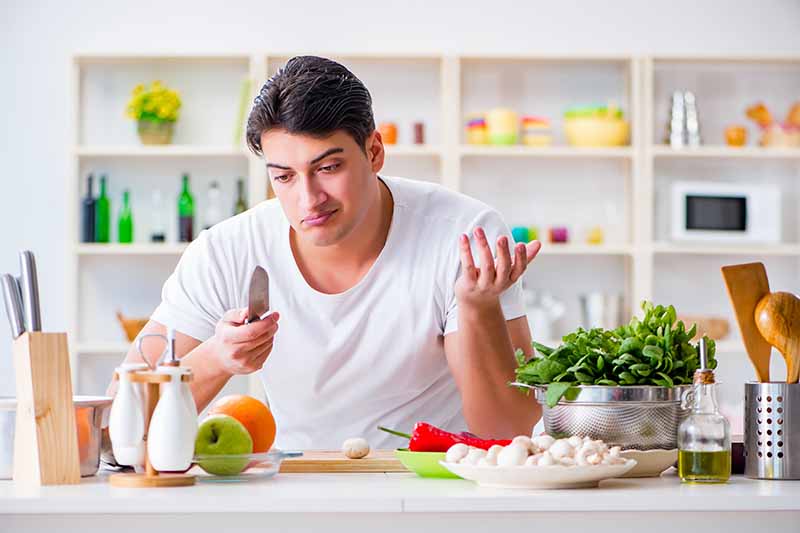
Don’t overwhelm yourself with new cooking techniques every single day. Give yourself a guilt-free break and order delivery every now and then, or set a date to enjoy dinner and drinks at your favorite restaurant.
Heat up some frozen chicken nuggets and tater tots. And don’t even think about making ketchup from scratch – the bottle you have in the fridge is perfect enough!
Homemade ice cream? Not today… That half-eaten pint of chocolate chip cookie dough ice cream you bought at the store is waiting for you.
You should never feel any bit of shame when you take a much-needed pause from cooking – you deserve some time off from all that reading, studying, prepping, standing, cooking, baking, and cleaning.
After enjoying some essential recharging time, you’ll be ready to jump right back into the kitchen with a fresh perspective and a new recipe to make!
Experienced chefs, what is the best advice you can share with beginners? And for those of you just starting out, do you have any other questions? Leave all of your comments and questions below!
Are you inspired to learn more after reading this article? Our helpful how-to guides can teach you about specific ingredients, new cooking techniques, entertaining like a pro, and more. Read these tutorials next:
- How to Bake with Whole Grains at Home
- How to Defrost Poultry: 3 Methods to Thaw Out Your Bird
- How to Cook Meals for a Week: Get Ahead with Meal Prep
© Ask the Experts, LLC. ALL RIGHTS RESERVED. See our TOS for more details. Originally published on March 7, 2017. Last updated on April 22, 2023. Product photos via Sur La Table. Uncredited photos via Shutterstock.
About Nikki Cervone
Nikki Cervone is an ACS Certified Cheese Professional and cheesemonger living in Pittsburgh. Nikki holds an AAS in baking/pastry from Westmoreland County Community College, a BA in Communications from Duquesne University, and an MLA in Gastronomy from Boston University. When she's not nibbling on her favorite cheeses or testing a batch of cupcakes, Nikki enjoys a healthy dose of yoga, wine, hiking, singing in the shower, and chocolate. Lots of chocolate.


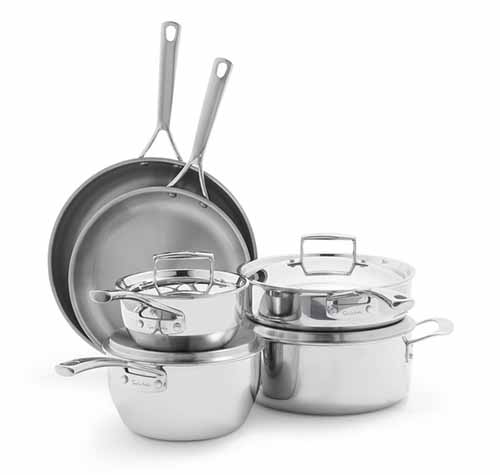

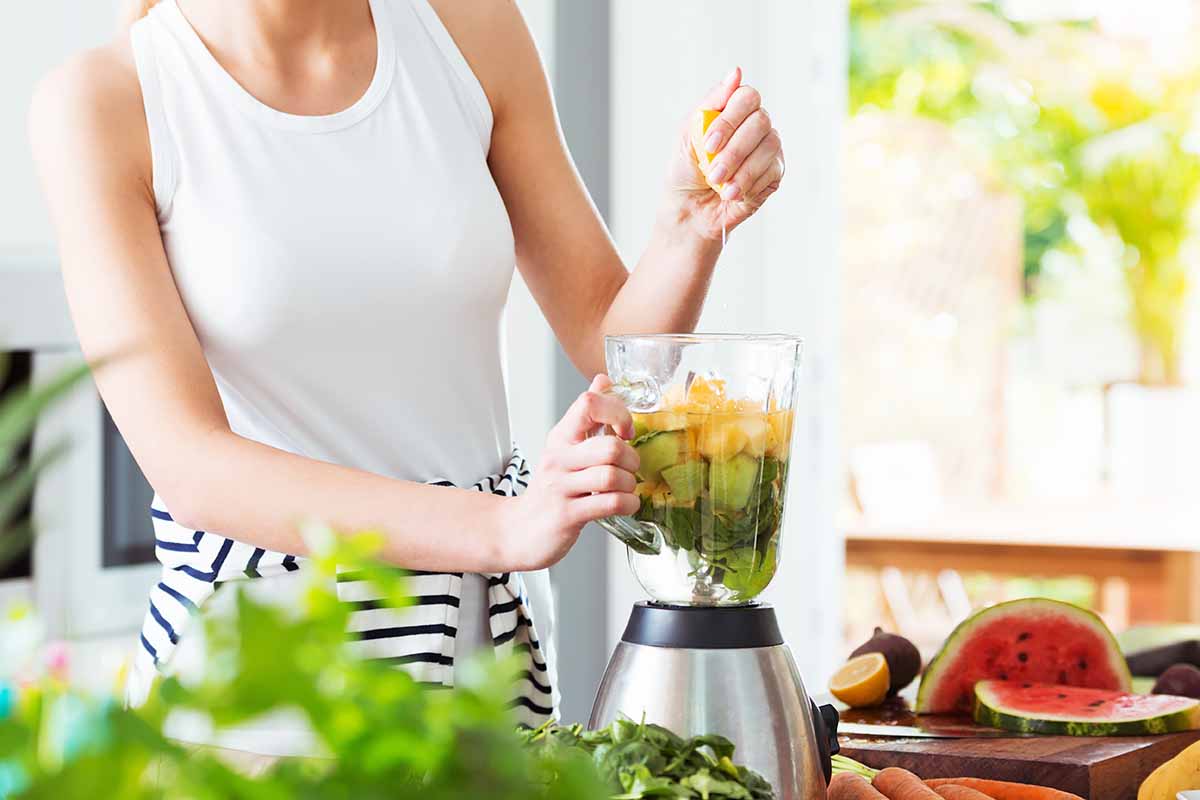
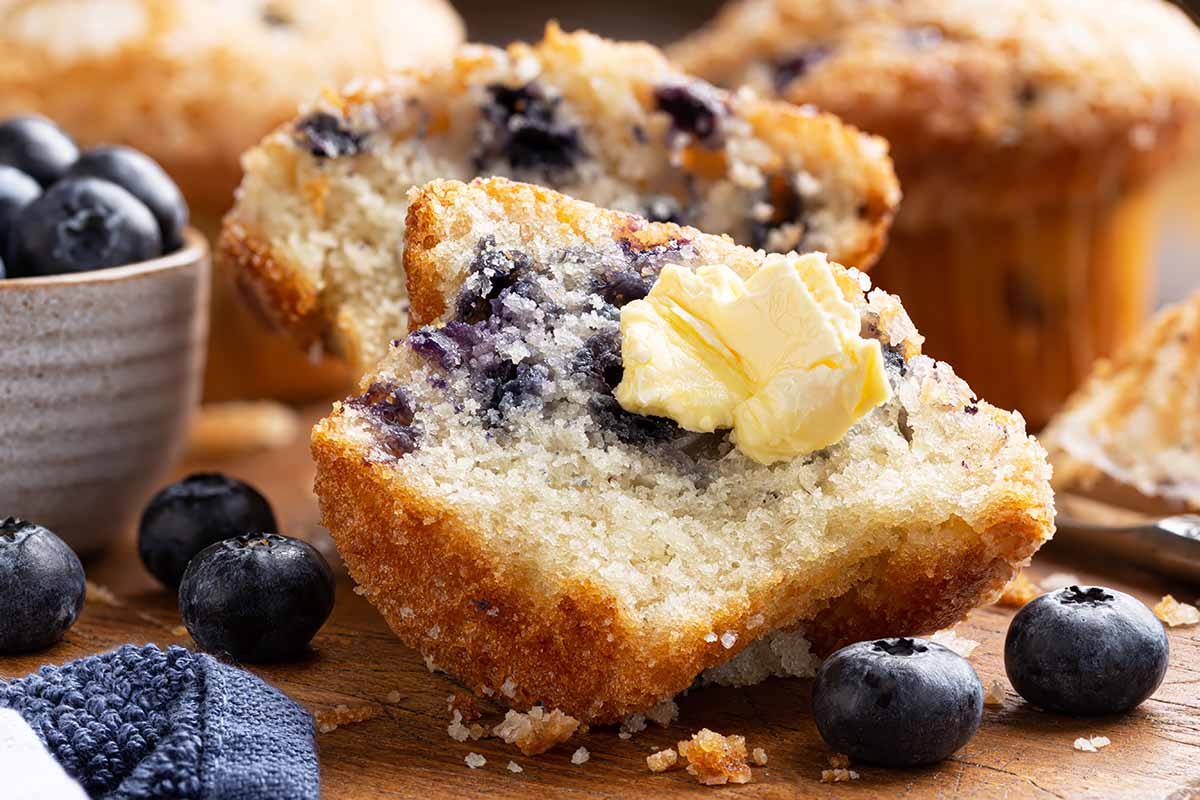
I remember my first time in cooking, its always messy in the kitchen! I also noticed that it took me more than an hour to finish the dish. Its because I wasn’t organized, the ingredients were incomplete and some utensils were not available in the kitchen. I must say that this is a very smart post to the beginners!
Ah…sailing in the same boat i see, only in my case, i was a nervous wreck and so unsure of myself and what i was doing, i won’t lie my first meal was a a total disaster and my mom didn’t not give me a break, i had to learn the hard, hard way, obviously we are not in the bloodline of chefs and cooks but even a simple meal that day was beyond repair, we slip, we fall but then we get up and learn from our mistakes…am indeed grateful for the tips above, they’ll go a long way.
I am going to send my 21-year-old daughter a link to this. I have tried, repeatedly, to help her learn to cook and she does fine if I’m behind her to supervise, but she totally freaks out when attempting it alone. I’ve always said the same thing to her- if you can read and follow directions, you can cook! Improvisation comes later.
I can’t stress enough to new cooks, that you must read the ENTIRE recipe first. Before you move a muscle. Some recipes throw in surprises that you just aren’t prepared for if you just start at the top and work your way down.
These were excellent tips for new cooks! I will definitely pass them along 🙂
Most people who have a dabble in cooking end up enjoying it, how can you not? It is so satisfying, especially if it tastes great. You showed your experience here and wrote a great post, I have been cooking for many, many years yet found this to be informative. Just goes to show, you are never to cleaver to learn something new.
Thanks for the article! I do admit I am not very organized in the kitchen at all. Not to mention I hate washing the dishes. I find it’s easier for me to cook things in the stove where I can “micromanage,” than baking in the oven when I won’t know I’ve burnt something until it’s too late.
This reminds of me what I used to be like in the kitchen when I first started cooking – what a disorganized mess I was! I used just about every board, knife, pan and utensil I could grab in the kitchen, and didn’t clean up as I want along either. I never read recipes as carefully as I should have done, and just about everything was a disaster. So the points you make about starting off with simple recipes and getting organized, are the two best pieces of advice you can give to a rookie cook.
I’m glad to say that my cooking has greatly improved – I even made your chicken cacciatore over the weekend, and it was delicious. By far one of the best cacciatore recipes I’ve come across, and as it’s my husband’s favorite, he was very impressed. 😉
I’ve gotten better as time has gone by. I used to skip steps or try my own spin on some thing I made and it didn’t always work. Now that I’ve done more cooking and have learned more, I am much more comfortable and my cooking is much better. I learned to start with simple recipes as you stated above and it made a difference. I’ve moved onto some of my mothers more difficult recipes and they have turned out good so far.
Thank you for putting time on making this list. Yes, as a first time cook from not so long ago, it is really the right equipment , enough preparation and willingness to learn that you are going to need to get start on cooking.
I like that you include the one about organizing your kitchen because for me, it is the common mistake of a beginner usually makes. Imagine while cooking, you forgot where you place the lid of the pan or spices that you need, in which this scenarios adds only the tension and pressure to the new cook. I still make this mistakes but mostly when baking (Imagine the mess).
Anyway, thank you for this article.
These are great tips! I’m envious at the thought of having uniform and organized pans, tools, and bakeware. Even when I buy complete sets, I end up with random odds and ends. But anyway, these are great tips for any beginner cooker or just someone who never really got fundamental ideas before branching out on their own.
I should email this to a couple of guys I know. Lol. These are great tips for the beginner, and hey sometimes even for those who think they have it down pat.
Thanks for all your hard work- informing the uniformed.
I am especially interested in an online cooking class I would love to see a review here about some of those resources. One of the best (but most expensive ones) I found was Rouxbe (pronounced like Ruby). I had a free trial and I learned so much in that time. Sadly, the course is too expensive, but it is extremely informantive with professional videos and explanations that make things crystal clear.
My boys are both in their twenties. You would think they could cook a simple meal. After all they have watched me as well as their grandmother cook for years. Not so, I really wonder how they can live on their own. I get text, and phone calls on a weekly basis.
The questions they ask me are common sense. Well at least I thought anyway. I have to give them a refresher course on how to boil an egg, or if pork chops can be baked. I really wish they would read this. It may help them they need it.
As a beginner in cooking I find this article to be very helpful. Each time I’m in the kitchen I’m always stressing out. I was completely disorganized when I first started out but I find that with the more and more I cook it becomes less stressful because I’ve learned from previous mistakes. I definitely need to go out and buy myself a pyrex set though. I live with my in-laws and they primarily use zip lock bags and cling wrap to store their food.
I like your tips for those just learning to cook. The equipment you suggest is equipment I wish I had in my kitchen right now. A good knife is essential as there is nothing worse than using a dull one which makes you work to harder to get your meal together.
I think half the battle is already won if you have decent kitchen equipment. Good quality cookware really does make a difference to the end result.
The best advice I think for someone who is just starting out cooking: Never give up. Don’t let a mistake stop you from trying again. Don’t be afraid to toss something that you can’t save. It happens sometimes even to the best cooks. It doesn’t define you. Sometimes we all can confuse the salt for the sugar (or vice versa).
I recently just had a mildly disastrous cooking session with my boyfriend. He was a beginner while I’ve been cooking quite a while. It was like we made our own episode of ‘Hell’s Kitchen’. Hahaha! I think the tips you have were very useful for solo cooking. But do you have any guidelines for two or more people just learning to cook together? In my case, it was a challenge since he wanted to do it his way, while I wanted to do it another way.
This article helped me loads! I’m a real beginner at cooking and I always get frustrated when something I make doesn’t look or taste the way they should be only to realize I’m getting way ahead of myself trying out the most difficult dishes out there. I also found equipping my kitchen helpful because there were loads of times that I needed an equipment but realized I didn’t have one yet. This just makes me feel like the stupidest beginner out there but then there’s always room to learn more! Great post!
I am very lucky to have a chef for a father. However, we may have hundreds of receipe books in my house we never follow them. All my friends loved coming to my house when I was younger! and no I love the homely smell when I step through the door for a visit. I must say I think I used his cook books more times than my dad used them. Mostly because he would read them for fun and to just get some new, interesting flavor combinations.
However anytime that I try to follow a receipe I spend half the time measuring things out exactly so. Whereas with the many years of experiences he can just guess it. I was always too afraid to do that. Once I left home however and finished work I would come home tired and not wanting to measure things out. So in turn I just started throwing things into a pot and seeing what happens. What would normally happen is something extremely tasty.
I guess from all my ramblings is to just try things yourself sometimes. As much as recipes can be good and easy to folow sometimes. Don’t be afraid to venture into new worlds and try new things!
I am sure this article will prove to be most helpful to any beginner cook. You are so right to begin with the equipment. I think this information has covered everything and some more great advice!
Staying organized and having the right kitchen equipment is definitely a necessity. I used to cook with cheap dull knives and I was never able to slice meat thin enough, in turn it when I would cook it the outside would be well done but the inside raw.
Another tip that I think is important for beginners is to start with the early receipes. Don’t try to cook a dish with so many ingredients and spices because you will get discouraged. Try cooking something simple. Once you master that move on to something more complicated.
I was interested in baking when my friend brought me a red velvet cake she had made. I asked her for recipes and instructions so eventually cooking became my hobby. When I started out, I was really disorganized. I would be frantic when I had the oven preheated but my ingredients were all over the place. My tools were scattered throughout the kitchen as well so after I finished mixing something, I would need to find my spatula. I’ve learned from my mistake and really, all beginners should definitely be organized when cooking because it saves you so much trouble. Thanks for the post! I wish I had seen this when I first started out!
Great tips for beginners! I remember the time when I was just starting to cook. I’ve always enjoyed helping my mother in the kitchen, especially when she was baking something tasty. However, I didn’t start actually cooking my own dishes until I was about 17. I totally agree with you that getting the feel of it is an important tip. I was so afraid of ruining something at first so I would try to follow the recipe precisely. But I soon learned that it’s ok to make your own adjustments and that you need a little bit of intuition while cooking. Also, I think one should learn not to see cooking as a chore. Personally, I find it fun and relaxing so I’m always on a hunt for new and exciting recipes.
I would say all of this is so true! I struggled a ton when I first started cooking, since I had no real kitchen gadgets, and all of my “sharp knifes” cut as well as a butter knife. Also, another tip, never raise the temp to cook the food faster, I have done this and its definitely worth waiting the extra time for it to cook, rather than eating burnt food!
Thank you for sharing these cooking tips. These are very helpful!